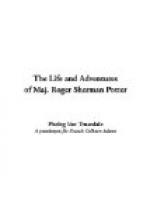his bucket. Having drank of the limpid water
from one of his tin cups, and placed the bucket before
old Battle, whom he patted with great fondness, the
major next proceeded to take care of his disconsolate
chickens, which for the last three miles had been keeping
up an opera of discordant sounds, to his great annoyance.
Uncovering his coop, which he carried at the tail
of his wagon, he set two tin cups of water before
them, and scattered moistened meal at their feet,
enjoining them to hold their peace in the future.
And while in the act of doing this, he reminded me
that great men were exalted by small things, and however
bemeaning the nursing of chickens might be regarded
in a military man, there was in it a nobleness the
great only could appreciate. The chickens, however,
did not seem to appreciate his sacrifice of dignity,
for they devoured their food with an increase of music.
Having attended to the wants of his live stock, the
major frisked round his wagon to see that his wares
were all safe, and then commenced singing a song,
as if a transport of joy had suddenly come over him.
“I tell you what it is, my friend,” said
he, pausing in the middle of his tune, and drawing
his favorite flask from his breast pocket, “the
world ’ll think none the less of us for traveling
thus shabbily. There may be nothing courtly in
the profession of tin-peddling, yet it is an honorable
enterprise, and has its obstacles as well as other
honorable enterprises.” I besought him
not to make himself uncomfortable on my account; that
I was not yet so famous that I could not ride over
the country on a tin-wagon, without feeling it a sacrifice
of dignity.
We now sat down by the spring together, and proceeded
to refresh ourselves with his crackers and cheese,
to which I added a newly-baked pumpkin pie my mother,
in the outpouring of her simplicity, had slipped into
my haversack; and while regaling ourselves in this
unpretending manner, the major, whose ardor was rather
increased by the liquid he mixed with his water, resumed
the recital of his first adventure in New York:
“Being desirous of facilitating the Quaker’s
honesty, my companion, General Fopp, suggested an
easy way of disposing of the matter. The pocket-book,
he said, no doubt contained an enormous amount, which
the unlucky owner would be anxious to regain as early
as possible in the morning, and to that end would
advertise in all the newspapers, offering a large
reward to the lucky finder, as an inducement for him
to preserve his honesty. The first step then would
be to find a convenient place for counting the contents
of the pocket-book, and considering the amount which
could be properly offered the Quaker, as the reward
of his honesty. So, after consulting within myself
for some few minutes, I followed my companion and
the Quaker into the back parlor of a cigar shop, where
we carefully counted the great roll of notes, and
found the amount to be exactly four thousand three
hundred and twenty-two dollars, which nice little sum,




